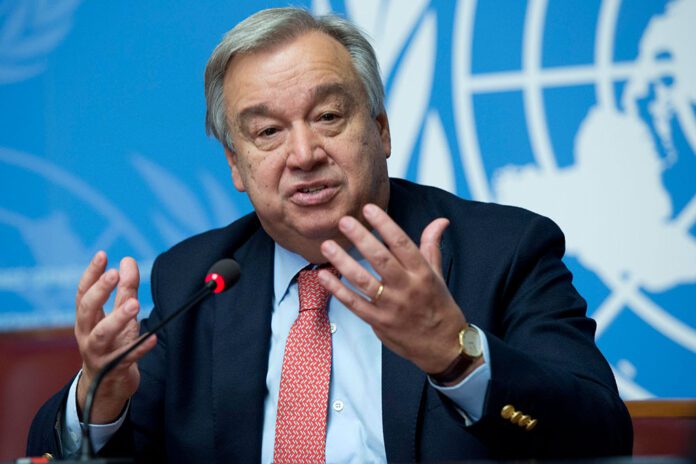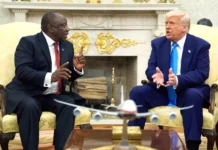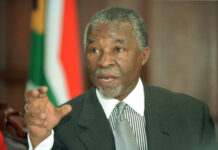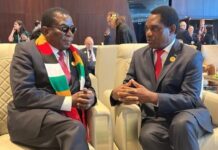THIS week, as world leaders gathered in New York for the UN General Assembly (UNGA) high-level debate as part of celebrating the 80th anniversary of the founding of the UN, gloom and doom over-shadowed the waning nobility of the organisation’s charter.
The “high-level week” at the UN is held every year in September, and attracts heads of state and government from around the world. They take to the same podium in a tradition of one after the other, outlining global priorities in accordance with the national interest of their countries.
The UN Secretary-General Antonio Guterres, an eloquent straight-talker who has a penchant to wear his heart on the sleeve, is the first to take to the podium as is customary for the incumbent.
This year’s UNGA took place amid a flurry of global conflicts marked by the ongoing Israeli genocide in Gaza, as well as the war in Ukraine. There is the famine in Sudan and a civil war that somehow escapes requisite global attention. The other centres of international instability uttered in hushed tones include the decades-old economic blockade by the US of Cuba (since the 1960’s) and in recent years also Venezuela.
The Junta in Myanmar continues to rule with a sword, and the people of Afghanistan are languishing in squalor and poverty as part of their collective punishment due to the Western-led disapproval of their governing Taliban regime that caused the US military to depart the country under the most ignominious circumstances, marked by televised images of desperate Afghans who had collaborated with the US clinging to the wings of fleeing planes.
The annual UNGA has in recent years become more interesting not for what is discussed, instead for what is avoided. The Global South nations including those in BRICS have repeatedly decried the rising spate of the US-led unipolar world order.
by TaboolaPromoted Links
You May Like
Buy the Dip: Top 5 Dividend Stocks with Growth Potential
Seeking Alpha
Body at Salt River mortuary confirmed to be that of businessman Roger Brijlal
Buy the Dip: 5 Dividend Stocks with Growth Potential
Seeking Alpha
Tributes pour in for Evangelist and theologian, Voddie Baucham Jr
In practical terms, unilateralism undermines the principles enshrined in the UN Charter, which are premised on the spirit of consensus-seeking and multilateralism. The UN was founded immediately following the end of a bloody WWII in 1945 “as a practical strategy for the survival of humanity”.
In his opening address before UNGA 2025, Guterres painted a picture as bleak as the Majority World has constantly decried. As I indicated above, the UN chief seldom minces his words. The world is awash with overlapping crisis — from wars and humanitarian emergencies to climate breakdown, he noted, before laying down the gauntlet: “Leaders must decide now what kind of world we choose to build together.”
It was not the first time Guterres had issued impassioned plea to the world leaders to return to the UN Charter principles. Sadly, oftentimes his appeals have fallen on deaf ears. To his credit, Guterres never tires. He drums up his message of a peaceful coexistence regardless.
In my view, many of the world leaders of today have blood of the innocent on their hands through either commission or omission. Again, Gaza is a perfect example of a complex yet international complicity.
“Eighty years on,” Guterres cut through an aura of collective hypocrisy that permeated every block of the UN HQ, “we confront again the question our founders faced — only more urgent, more intertwined, more unforgiving.”
International relations in the 21st century seem to have given in to the big-man, small-man syndrome.
Massively impactful poles of power that have usurped the powers of the UN include the intergovernmental political and economic forum called the Group of Seven, better-known as the G7 — a club of the world’s wealthiest nations comprising of the US, UK, France, Germany, Canada, Italy and Japan.
They coalesce around their common geopolitical agenda, and unleash internationally-binding economic sanctions on opponents – real or perceived – whilst side-stepping the authority and role of the UN.
Almost always in tow of the G7 is the EU. The block’s leading members can be found in the G7. The G7 and EU’s determination of international discourse is unmatched, so is their agenda-setting framework that is traditionally aided by their control of mainstream media through which news coverage is carefully pre-determined.
The G7’s influence of public opinion reaches near and far from their borders. It takes a form of persuasion, such as compliance and adherence to the so-called rules-based world order. When their power of persuasion fails, coercion kicks in, often with indescribable brutality.
These are the characteristics of the state of the world order in which Guteress addressed world leaders who have mastered the art of what Shakespeare would have probably described as “see no evil, hear no evil”.
The double-standards of the domineering Western hegemony have caused the Global South nations to thrash out their survival alternatives. BRICS is one such example. So is the Shanghai Cooperation Organisation (SCO), which is head-quartered in China and at its recent summit, some 26 heads of state and government turned up is a great show of solidarity.
Week in and week out, the nations of the Majority World earnestly carve out ways to counter modern-day imperial agenda of the West. The wounds of colonialism are yet to heal, and the scars of slavery still visible in a unipolar world order marked by gross inequality and travesty of justice.
When the self-assured US President Donald Trump took to the podium at UNGA 2025, he started by ranting about “a broken escalator and a broken autocue” he believed were acts of intentional sabotage in the era of extreme mistrust.
He boasted that the US has solved at least seven wars independent of the UN, thereby confirming precisely the school of thought that the UN has become an empty shell.
On the side-lines of the UNGA 2025, Trump held a meeting with thirteen leaders of Islamic and Arab States most affected by the Israeli-led conflict-ridden Middle East.
There, the US leader presented a 21-Point Plan to end the war on Gaza, which the US bankrolls and arms with limitless support of weapons and funds to Israel.
This is one of the many examples of how the UN has become irrelevant in the greater scheme of things. Look, too, at how the US refused visa for the President of the Palestinian Authority Mahmoud Abbas to attend the UN meeting, where several Western traditional allies of the US such as the UK and France broke rank and officially recognised the troubled State of Palestine. There was no visible outcry over Washington’s overreach, taking it upon herself to decide who may or may not attend a UN meeting.
I want to argue that the international architecture is fractured to near permanent impairment, unless sanity prevails and the syndrome of “big-man, small-man” is completely abandoned.
Additionally, a litany of dangers inherent in the collapse of the UN system is too ghastly to contemplate. The inability of the UN Security Council to successfully pass binding resolutions due to the obsolete veto power of the five permanent members is the biggest anomaly of modernity.
Out of the 193 UN member-states, a large majority, 157, recognise the State of Palestine as a sovereign state. This is approximately a whopping 81% of all UN members, yet until the US will no longer to be allowed to veto Palestine’s full acceptance into the UN, the nascent country will remain in the periphery of the international order.
This is another example of the need to reform the UN system, especially the Security Council, whose resolutions are the only ones binding under international law.
It will be a tragic period if our inconsiderate world rulers could allow the UN to perish. The alternative will be the balkanization of the international community, increased hostile competition for resources, flagrant attacks on adversaries and quite frankly, a survival of the fittest in our beautiful world that could ultimately be turned into one gigantic jungle by selfish interests of a powerful few.
* Abbey Makoe is the publisher and editor-in-chief of the Global South Media Network (gsmn.co.za). The views expressed are personal.
** The views expressed here do not reflect those of The Zimbabwe Mail.











